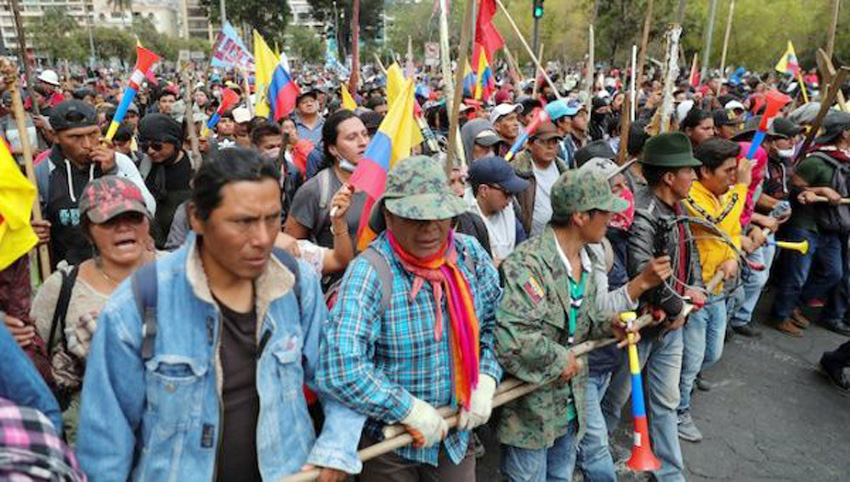On the International Day of the World’s Indigenous Peoples, 9 August, the International Trade Union Confederation (ITUC) has made a fervent call for the global recognition of the right to self-determination for Indigenous communities.
This call comes amid ongoing struggles and systemic discrimination faced by Indigenous populations worldwide.
ITUC General Secretary Luc Triangle highlighted the significance of this day, stating: ‘This day is an important reminder of the rich cultural diversity, historical contributions, and ongoing struggles faced by Indigenous communities.
‘Indigenous peoples face systemic discrimination, marginalisation, and violations of their rights.
‘Issues such as the exploitation of natural resources on Indigenous lands without consent and encroachment onto their territories require immediate attention.’
A recent report from the International Labour Organisation (ILO) underscores the severity of these challenges:
- Over 86% of Indigenous peoples globally work in the informal economy, compared to 66% for their non-Indigenous counterparts.
- Indigenous peoples are nearly three times more likely to be living in extreme poverty compared to their non-Indigenous counterparts.
- The share of wage and salaried workers is considerably lower among the Indigenous (27.9%) than among the non-Indigenous (49.1%) population.
- Globally, Indigenous peoples earn 18.5% less than non-Indigenous people.
Luc Triangle continued: ‘The right to self-determination lies at the heart of Indigenous peoples’ struggles; it underpins their ability to freely determine their political status and pursue their economic, social, and cultural development.
‘This principle is not only a right, but a necessity for the preservation of Indigenous identity, culture, and way of life.
‘We stand in solidarity with Indigenous peoples in their quest for justice, equality, and self-determination.
‘We call on governments, corporations, and international bodies to ratify and implement ILO Convention No.169 to protect Indigenous rights globally.’
ILO Convention No.169 addresses the rights of Indigenous and tribal peoples.
It offers a comprehensive framework to safeguard their social, economic, and cultural rights and stresses the importance of their participation in decisions affecting their lives and lands.
This is pivotal for the sustainability of policies and programmes tackling challenges such as poverty, inequality, social conflicts, and climate change.
Beyond the ratification and implementation of C169, the ITUC called for:
- Respect for land rights: governments and corporations must obtain free, prior, and informed consent before undertaking any projects on Indigenous territories.
- Protection and celebration of cultural heritage: the traditions and languages of Indigenous peoples must be preserved for future generations.
- Inclusive development: policies should respect the rights and needs of Indigenous communities and include them in decision-making.
Workers’ unions are enhancing the representation of Indigenous peoples in their organisations and building alliances with Indigenous peoples’ organisations to address mutual concerns, including compliance with ILO C169.
Examples include:
– New Zealand: Unions are advocating for legislation to make ethnic and gender pay gap reporting mandatory. This transparency is crucial to closing the significant gender pay gap faced by Indigenous women, with Pacific women earning around 26.5% less than non-Indigenous men.
– Australia: Unions are working to ensure strong union representation for Aboriginal and Torres Strait Islander workers, empowering them to achieve just wages, social protection, and self-determined, fulfilling employment.
– Norway: The Norwegian Trade Union Confederation (LO Norway) promotes Indigenous culture and identity through leadership, cultural outlets, and support for the truth and reconciliation process.
– Latin America: Trade unions are using the ILO’s supervisory mechanisms to hold governments accountable, highlighting issues such as occupational safety and forced labour.
– Peru: The Autonomous Workers’ Confederation of Peru (CATP) has pointed out flaws in judicial proceedings concerning the murder of Indigenous trade union leaders, ongoing harassment of the victims’ families, and illicit logging facilitated by the habilitación system.
– Argentina: The General Confederation of Labour of the Argentine Republic (CGT-RA) and the Confederation of Workers of Argentina (CTA) have raised concerns about poor occupational safety conditions and instances of police violence against Indigenous
protesters.
The CTA also criticised the lack of consultation during Jujuy Province’s constitutional reform process in 2023.
Worker delegates at the 109th International Labour Conference in 2021 reported violence against Indigenous peoples in Honduras.
Meanwhile, this week, as the world commemorates the 79th anniversary of the atomic bombings of Hiroshima, UNI Global Union (Union Network International) has issued a statement honouring the memory of the 140,000 lives lost in 1945 and reflecting on the long-lasting impact of radiation and trauma.
UNI Global Union has renewed its call for efforts towards achieving a nuclear-weapon-free world amid rising global
instability.
‘We mark this sombre anniversary by remembering those who lost their lives and those who were permanently affected.
‘We must ensure that weapons like these are never used again,’ said Rajendra Acharya, Regional Secretary of UNI Asia & Pacific.
He highlighted the urgency of this call in light of ongoing global conflicts, mentioning wars in Myanmar, Ukraine, and Gaza.
‘A secure, democratic future in our region and across the globe requires peace, which is undermined by the existential threat of these weapons,’ Acharya added.
He emphasised that this week serves as a period for remembrance, reflection, and solidarity with families affected by the bombings.
